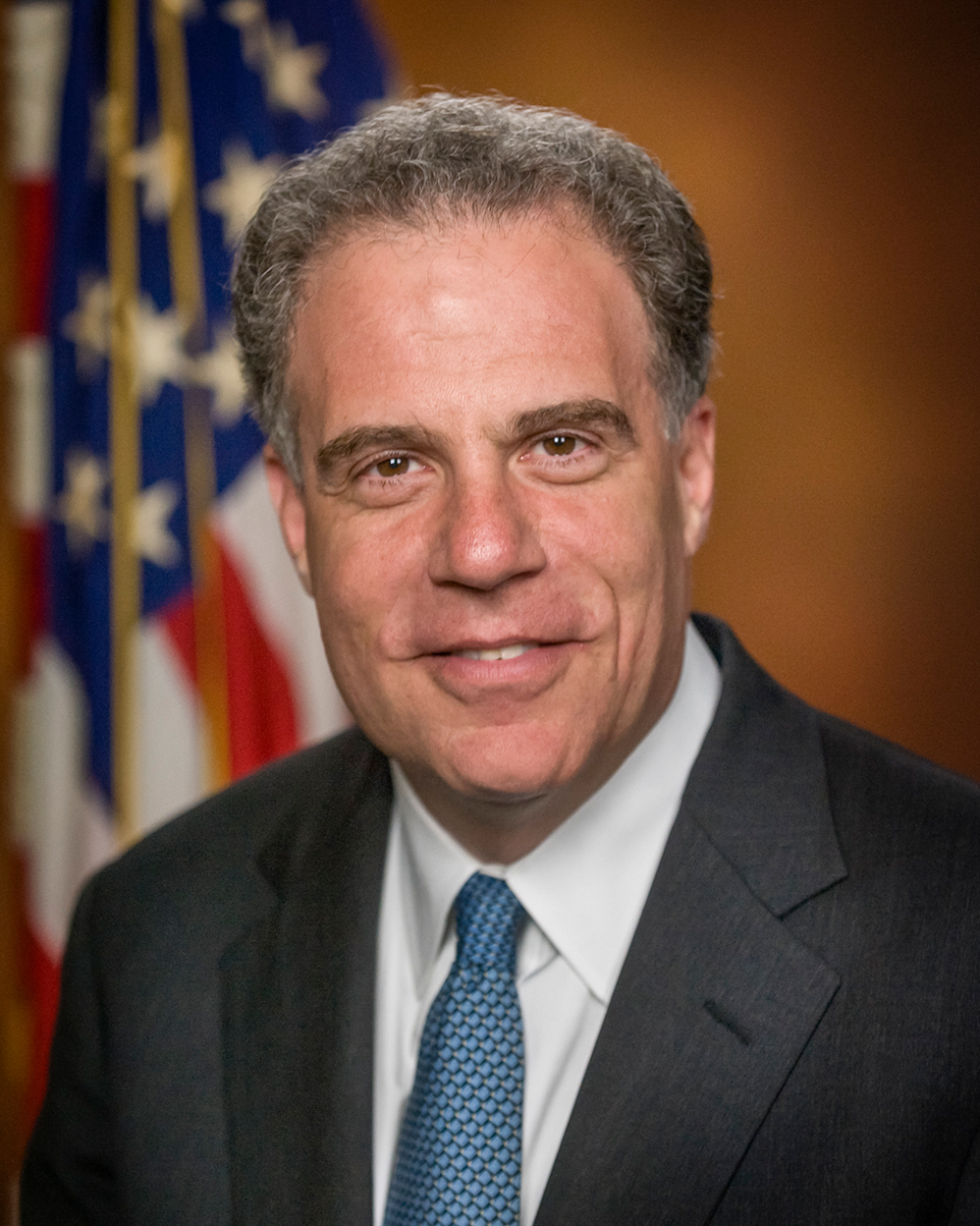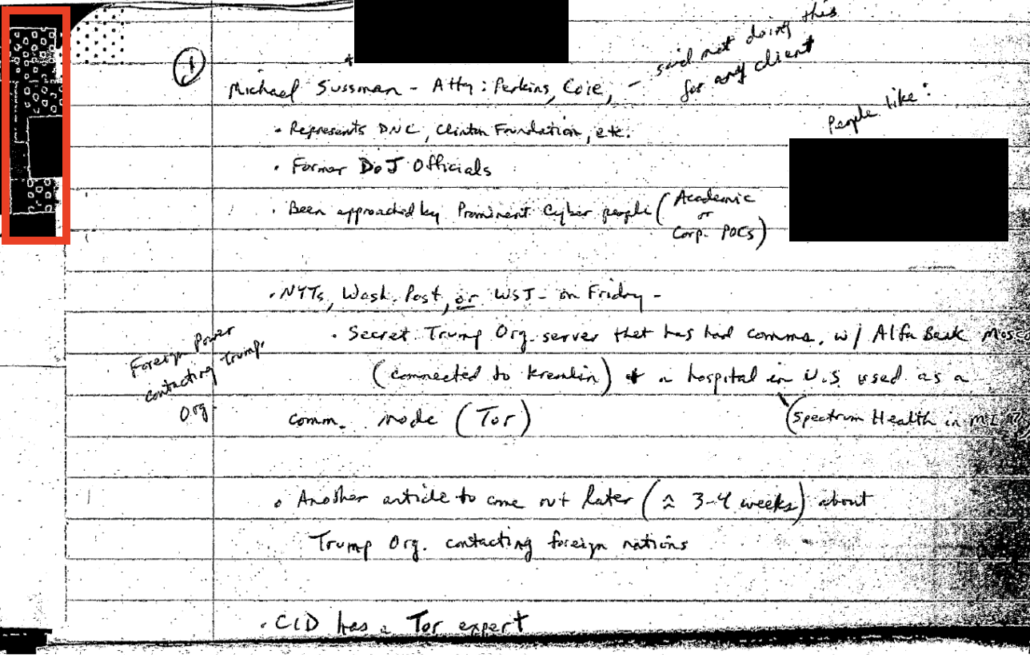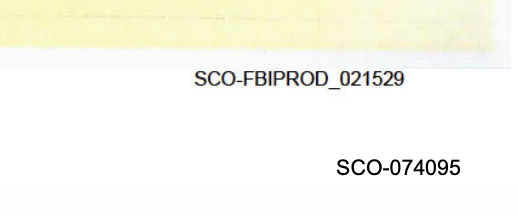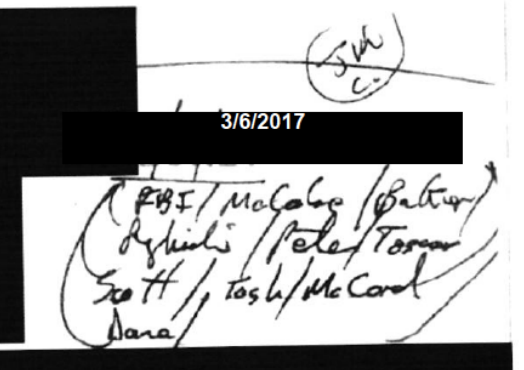Thirty Months after Disputing Michael Horowitz, Durham’s Team Suggests They’ve Never Looked at the Evidence
In Michael Sussmann’s filing explaining that he couldn’t include highly exculpatory notes — written by Tashina Gaushar, Mary McCord, and Scott Schools — from a March 6, 2017 meeting in his motion in limine because John Durham had provided them to him too late to include, Sussmann claimed that the files were not among those for which Durham had gotten permission to provide late.
The Special Counsel neglects to mention that these handwritten notes were buried in nearly 22,000 pages of discovery that the Special Counsel produced approximately two weeks before motions in limine were due. Specifically, the Special Counsel produced the March 2017 Notes as part of a March 18, 2022 production. The Special Counsel included the March 2017 Notes in a sub-folder generically labeled “FBI declassified” and similarly labeled them only as “FBI/DOJ Declassified Documents” in his cover letter. See Letter from J. Durham to M. Bosworth and S. Berkowitz (Mar. 18, 2022). And although the Special Counsel indicated on a phone call of March 18, 2022 that some of the 22,000 pages were documents that made references to “client,” he did not specifically identify the March 2017 Notes or otherwise call to attention to this powerful exculpatory material in the way that Brady and its progeny requires.
[snip]
[T]he Special Counsel has also failed to explain why this powerful Brady material was produced years into their investigation, six months after Mr. Sussmann was indicted, and only weeks before trial.3
Sussmann was wrong.
When Durham got an extension to his discovery deadlines, he got special permission to turn over (among other things) materials from DOJ IG at a later date.
DOJ Office of Inspector General Materials. On October 7, 2021, at the initiative of the Special Counsel’s Office, the prosecution team met with the DOJ Inspector General and other OIG personnel to discuss discoverable materials that may be in the OIG’s possession. The Special Counsel’s office subsequently submitted a formal written discovery request to the OIG on October 13, 2021, which requested, among other things, all documents, records, and information in the OIG’s possession regarding the defendant and/or the Russian Bank-1 allegations.
[I]n January 2022, the OIG informed the Special Counsel’s Office for the first time that it would be extremely burdensome, if not impossible, for the OIG to apply the search terms contained in the prosecution team’s October 13, 2021 discovery request to certain of the OIG’s holdings – namely, emails and other documents collected as part of the OIG’s investigation. The OIG therefore requested that the Special Counsel’s Office assist in searching these materials. The Government is attempting to resolve this technical issue as quickly as possible and will keep the defense (and the Court as appropriate) updated regarding its status.
In the pre-trial hearing on Monday, Andrew DeFilippis explained that the files came from DOJ IG (and therefore were subject to that later discovery deadline).
We located those statements in the notes in February or early March, when we received a huge production from the DOJ Inspector General’s office. As soon as we noticed that in the notes, we put them on very rapid declassification at the FBI and turned them over to the defense about a week later.
DeFilippis offered an unconvincing excuse for burying belatedly provided Brady material two layers deep in file folders without specific notice. He described the decision to flag the materials as an internal Government decision, which is an odd description unless Michael Horowitz’s office — or those involved in declassifying the records — forced the decision:
We then, speaking internally as the Government, decided it would be important to flag those notes for the defense. And so the day that we produced them, we got on a call. We wanted to be in a position to flag it in a way that we didn’t just put it in the end of a paragraph of a discovery letter. We flagged for the defense that we were going to be producing notes and that that included notes in which the word “client” appeared. And we told them that we thought that would be relevant to them.
[snip]
Let me just say that there was absolutely no effort by the Government to delay here or to hide these in a large production. That is precisely why we got on a phone call and flagged it for the defense.
It’s almost like DeFilippis was hoping this would get no notice.
I can understand why. I’ve described how astounding it was that Durham did not go looking for evidence from DOJ IG until — by Durham’s own telling — October 7, more than two weeks after indicting Sussmann (and likely not long enough before indicting Igor Danchenko to learn key details that undermine at least one charge against him).
But this late provision of exculpatory evidence means one of two things:
- Durham has always had the files, but did such a poor job of looking for it in discovery he didn’t find it in his own files even as he started hunting Michael Sussmann
- Durham never had these files
The latter is the more likely possibility, which, as a threshold matter, would mean Durham never reviewed key files that DOJ IG had used in high level witness interviews before disputing Michael Horowitz’ conclusion that the investigation was predicated appropriately. Durham is, literally, only reviewing key files three years into his investigation.
Along the way, he’s learning that conspiracy theories he has been chasing for months and years are false.
The revelation that Durham is discovering exculpatory information in DOJ IG’s files is as important to the efforts to blow up the Mike Flynn prosecution two years ago as it is to the Sussmann prosecution. That’s because the Jeffrey Jensen review of the Flynn prosecution and the Durham investigation were believed to be closely aligned. Indeed, I have shown that the handwritten notes from the FBI that Durham will rely on at trial show the same markers of unreliability that documents that were altered in the Flynn case had.
As I explained in this post, Jensen’s documents started with the Bates stamp used throughout the Flynn prosecution.
But after a period of time, they used a Bates stamp with a different typeface, albeit continuing the same series, suggesting someone else was doing the document sharing.
But if they’re drawing on the same source documents, Durham should at least know notes of that meeting exists. Jeffrey Jensen received and relied on at least one set of notes — Jim Crowell’s notes — from the March 6, 2017 meeting. Those notes, along with Tashina Gauhar’s notes of an earlier briefing and all those that got altered, also have the fat typeface.
The Tashina Gauhar notes turned over to Sussmann (and the others turned over) not only are based off a scan of her original notes and have no post-it notes on them, but they bear both Durham’s Bates stamp (SCO-074095), but also one that likely comes from DOJ IG (SCO-FBIPROD_021529).
All of which seems to suggest there was the same cherry-picking that went into the Durham investigation and the Jensen “review.” Neither reviewed — neither could have!! — what really happened. They reviewed selected records and then (in the Jensen review) altered those records to make false claims that the former President used in a debate attack.
I’ll come back to the issue of what appears in the notes Sussmann released that conflicts with the Flynn releases.
But I’m also interested that Durham is stalling on providing other notes from the meeting.
2 The defense has requested that the Special Counsel search for any additional records that may shed further light on the meeting and certain of those requests remain outstanding. To date, the Special Counsel has represented that the only additional notes from attendees at the meeting that he has identified do not reference whether or not Mr. Sussmann was acting on behalf of a client. The absence in those notes of any reference to whether Mr. Sussmann was acting on behalf of a client also raises questions regarding materiality of the charged conduct: if the on behalf of information were truly material to the FBI’s investigation, presumably all note takers would have written it down. [my emphasis]
Durham can’t be withholding notes because they don’t mention Sussmann having a client. That’s because Scott Schools’ notes mention that the Alfa Bank tip came from an attorney, but don’t mention that he was there on behalf of a client (Schools’ notes may have been included because they are the only ones of the three provided that attributed this discussion to Andy McCabe).
There are at least two other sets of notes from this meeting that are known or presumed to exist:
- Jim Crowell
- Peter Strzok
And there were at least three other people present at the meeting known to take notes:
- Bill Priestap
- Andy McCabe
- Dana Boente
Importantly, in Durham’s objection to admitting these notes as evidence, he makes it clear that James Baker (inexcusably as a lawyer) did not take notes of this or any other meeting, but he does not say whether Priestap (or Trisha Anderson) took notes.
Moreover, the DOJ personnel who took the notes that the defendant may seek to offer were not present for the defendant’s 2016 meeting with the FBI General Counsel. And while the FBI General Counsel was present for the March 6, 2017 meeting, the Government has not located any notes that he took there.
If Priestap took notes, one copy should be in Durham’s possession, in the notebook of Priestap’s notes already on Durham’s exhibit list.
DOJ has been trying to prevent anyone from looking at Andy McCabe’s notes for some time.
But one thing that turning over the DOJ IG retained notes for the others will show is whether alterations in the Strzok, Priestap, and McCabe notes were made.
It’ll also make it easy to test why Jensen’s review redacted a date and added one — albeit the correct one — in the Jim Crowell notes.
That is, I wonder if Durhams’ reluctance to turn over those materials stems not from any facts about his own investigation, but from an awareness of the cherry-picking — and possibly worse — that having turned over the past one reveals.
Three posts on the altered documents from the Mike Flynn case
The Jeffrey Jensen “Investigation:” Post-It Notes and Other Irregularities (September 26, 2020)
Shorter DOJ: We Made Shit Up … Please Free Mike Flynn (October 27, 2020)
John Durham Has Unaltered Copies of the Documents that Got Altered in the Flynn Docket (December 3, 2020)











“DOJ has been trying to prevent anyone from looking at Andy McCabe’s notes for some time.”
Just to clarify, does DOJ here mean Durham’s team, or is this something the Department at a higher level has wanted locked down?
I was wondering same.
I think one of many reasons why DOJ settled with McCabe is they didn’t want to give him discovery, including his notes.
They may not be covering it up, per se, but trying to defer having to deal with DOJ committing crimes.
Oh, something just clicked in my mind. This so obviously makes sense. I wonder what it is about our brains that takes them so long to understand and/or accept this kind of pattern of intent. Some kind of silo psychology, maybe.
In my experience, humans are good at *seeing* patterns, as in visually (hence why data visualization is so huge in data science and analytics), but they’re very much not so good at *thinking* systemically and putting disparate pieces of information together that form a pattern when they have to do it in their heads. There are obviously ways to train people to think systemically, but most people aren’t inherently good at it.
From Marcy’s comment:
“They may not be covering it up, per se, but […]”
It seems that Marcy’s gift is in “seeing things” and so forming patterns, because they are not there, are disguised, are out of order, or simply have arrived too late. Consider these as a way of describing what I mean:
Images in drawing that arise from negative space.
Failures in Chekov’s gun to appear.
Silence that speaks volumes.
Dogs that didn’t bark.
Motives of ladies that doth protest.
Carts before horses.
Barn doors, closed, but too late.
And more generally, and for feeling, consider:
Apophatic prayer.
“Emptiness” in Buddhism.
That is my take on Marcy. And for her, I am thankful,
Sandor
Thank you, great appreciations for EW! Dr. Marcy is a rare treasure, and I have often recommended friends to visit the site. I’ve been saying for some time, it’s time for younger folk to step up, and my generation to step down. Thank you for all the hard work, Marcy (having spent much time in dusty archives and libraries, I may understand a bit how much work your reports entail).
such a classic example of the smooth untangling and connecting of bits of proofs that circle gently in the greenhouse of marcy’s bonny brain. who wants to replicate everything this post includes into a tapestry ? i have a model in mind …
Triggered by greenbird’s challenge to “replicate everything this post includes into a tapestry,” I just followed the Durham tangent by reading his indictment of Igor Danchenko. From it I deduce that Igor is a literally pathological liar (in the sense that he harmed himself every time he made stuff up) who spun a trip to the Bonx Zoo with a relative into a consequential meetup. Clearly Durham is targeting this guy 1.) to produce more froth, and 2.) to predicate further incursions on the unnamed folks Danchenko interacted with.
Durham’s arguments as to the materiality of Danchenko’s flimsy lies could have been confected by a high school student. The fact that he basically cut and pasted the same boilerplate without nuance is embarrassing if you care about the federal justice system. I assume these arguments were designed just to be parroted by the likes of Pirro and Ingraham. Will they? I’m wondering when Durham’s weaknesses (and the underlying void where his proposed conspiracy should lurk) render his enterprise unrewarding, even for blowhard hacks.
The former would suggest Durham is an idiot. The latter suggests he is a crook.
If this is true, then he ought to dismiss the charges against Sussmann. The fact that he has not confirms to me that he is bent on injustice, and Team Sussmann is making that more and more clear with each set of filings and motions.
DeFilippis may be sitting at the Prosecution’s table in the courtroom, but he is quickly becoming a defense attorney, with a fool for a client.
Idiot. Crook. Whatever. Too many people have given Durham credibility for decades, where he has very long had none. Think that has been pointed out here before….
Yes, but having it pointed out before a federal judge is something that has not been done. Yet.
When does the Sussmann trial begin?
Last I heard, May 16. Less than a week from now.
The initial questionnaire for the jury was administered yesterday.
Voir dire begins Monday. Opening arguments currently slated for Tuesday.
Among the issues not yet resolved:
Whether Durham gets to pierce privilege claims made over Fusion GPS docs.
Whether DOJ can withhold at least one and possibly three or more pieces of classified information.
Whether Durham will call Manos Antonakakis and if so on what terms.
Possibly, what to do about Durham’s insistence that they can expand the scope of questioning to Eric Lichtblau beyond what he and NYT have gotten privilege waivers for.
This prompted me to re-read your “The Alfa Bank Dark Net at Noon (3/28/22)” post. The Lichtblau testimony should interest a wide array of listeners/viewers.
Nothing is over until it is over.
Dr. Wheeler,
I am thankful for your deep dive on Durham. But, I do hope you have a plan to keep one eye on the Jan 6th hearings that will be starting in less than 1 month. Your unique perspective on what will be revealed would be one that I (and I assume many others) would find most crucial.
Thank you for that consideration.
Lol. What makes you think that’ll be missed by coverage here at the emptywheel.net website?
I continue to cover hearings and docs on Twitter and do full posts when I think it merits it.
Here’s my live-tweet of Baked Alaska possibly blowing up his misdemeanor plea in full idiotic glory.
https://twitter.com/emptywheel/status/1524433469274738690
Here’s my post on how Alex Jones’ two employees are getting plea-curious.
https://www.emptywheel.net/2022/05/09/amid-plea-discussions-owen-shroyer-submits-a-half-hearted-first-amendment-challenge/
Half Baked might become an inadvertent new handle for the gent, Gionet.
Last time he was in a courtroom on a misdemeanor I think is still on appeal. I think same atty. How that guy got jumped into DC I have no idea.
He’s got a DC counsel as well, who I assume jumped the AZ guy in.
You are a whirlwind
Do you sleep?
😆
It strikes me that Durham is a fool too far over his head.
More like a gaslighter who has been playing the system for too long.
Or a drug dealer sampling his own merchandise.
So what is the likely outcome? Is this material denied to the defense (for the trial at least) because it wasn’t included on time? A delay to the trial? A sanction of the special prosecutor, with the material becoming admissible despite being found past the deadline, and no opportunity for the special counsel to try and find counter-evidence? Tough cookies for the defense–deadlines are deadlines, and even if the government delivers a haystack that may or may not contain the needle, it’s still incumbent upon the defense to find it in time?
And if exculpatory evidence is denied to the defense as a result of this, and Sussman were to be convicted–something that could be raised on appeal?
Is there at some point where Judge Cooper rules, perhaps sua sponte, that the prosecution has been acting in bad faith throughout the process, determines that the scope of the prosecution’s misconduct outweighs any public interest in prosecuting the case (even if one were to assume that the facts alleged were true), and dismisses it, perhaps as a sanction? Or is that sort of penalty outside the toolbox of the trial court judge (even if it might be an option for appeal)?
Hiding documents, providing altered documents – I am imagining an exchange at trial reprising the epic scene from “In the Name of the Father” – an unimpeachable document fully exonerating Sussmann comes to light complete with a post-it note in Durham’s hand stating “Not to be shown to the Defence”. Hilarity ensues.
One observation that I might make about the US legal system–and this comes from someone, I shall admit, whose actual in-person experience with it is limited to one speeding ticket (no court appearance) and one stint of jury duty (misdemeanor domestic violence case, utterly incompetent public defender, guilty on all counts)… is that it doesn’t seem well suited to deal with lawyers who act in bad faith.
Bad-faith principals, it deals with fine–even those who appear pro se, generally are kept under leash (mainly because they don’t know what they are capable of getting away with, and enjoy no presumption of good conduct–but the court system generally operates under the assumption the any lawyer who comes to the bar (whether a prosecutor, a defense attorney, or a civil litigator) will adequately fill his or her dual roles of zealous advocate for the client, and officer of the Court. So when a lawyer does start engaging in bad-faith tactics–filing frivolous motions, forgetting about evidence that might help the opponent that the lawyer is required to produce, blowing off deadlines, filing pleadings full of ambiguous claims, or other sorts of shenanigans that seek to delay or obstruct justice–judges seem to act surprised, are slow to catch on, and even when they do, the punishment is often a slap on the wrist. Even a bar referral seems to be a rare remedy, and other potential penalties (directed at the lawyer, rather than the principal), rarer still. Fines. Findings of contempt. Or bringing the principal into court and explaining to them that their attorney is about to lose them the case, and strongly suggesting that they fire their current lawyer and hire another who will act more responsibly.
There is accountability but it takes a lot and FWIW it would appear to need a jump-start from a judicial referral to be taken seriously (Judge Cooper can help here). I would recommend Ken White (Popehat) and his series on the Prenda Law fiasco (IIRC where a group of lawyers banded together to engage in extortion activities) for how the process can handle stuff like that. Just realize it’s only one data point.
I agree with you, but I think that lawyers for the Republican Party, or “conservative activists” or filthy rich crackpot oligarchs, and especially Trump and his gang DON’T believe they have any obligation to behave legally, ethically or morally. They all think they serve some kind of higher authority. They are a criminally insane cult. IMO, there needs to be a thorough house cleaning to rid the legal profession of these bad faith actors.
WHAT?